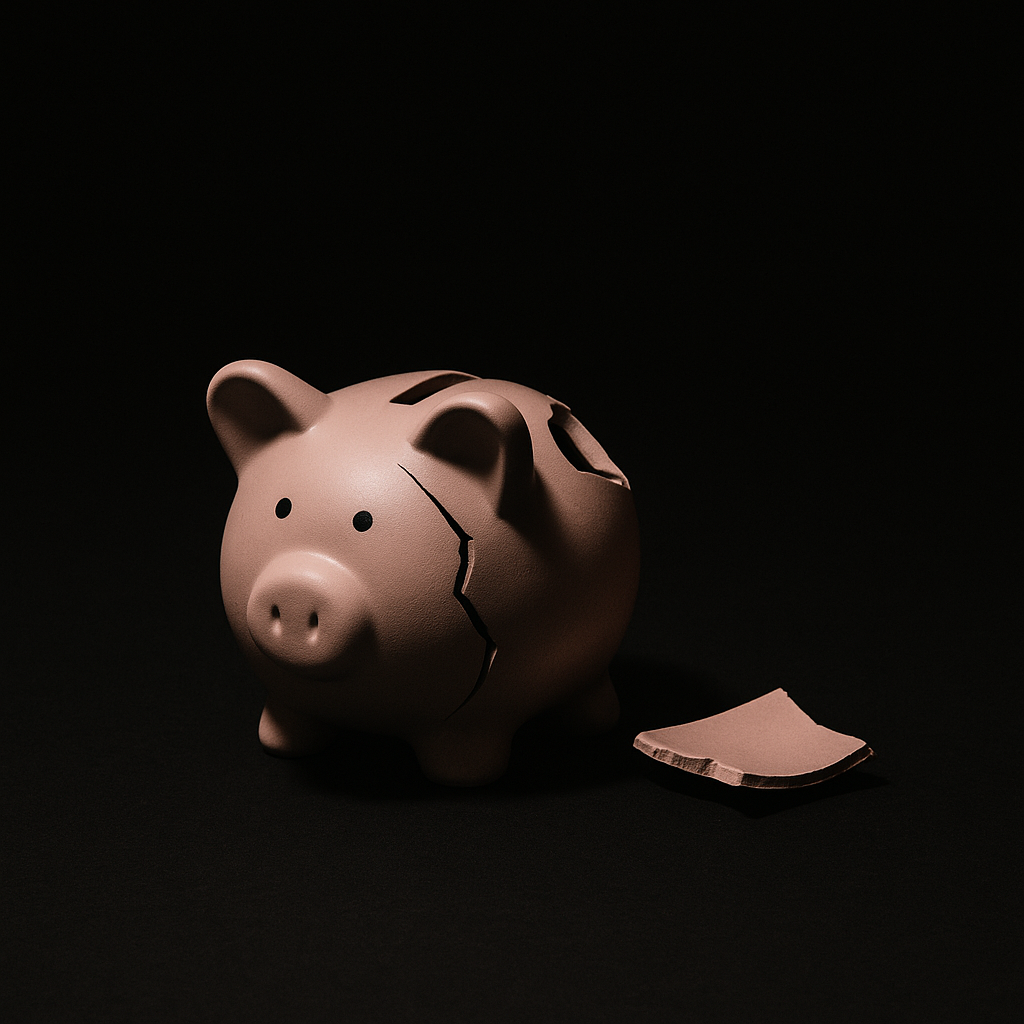When did working full-time stop guaranteeing stability?
When did “doing everything right” start feeling like you’re losing anyway?
Nearly half of the UK now lives from payday to payday. In the US, that number is closer to eight in ten. It’s not because we’ve forgotten how to budget, or because we’re all too tempted by Netflix. It’s because the system, that post-industrial miracle of endless growth, has quietly been restructured around extraction.
We’re told that this is the price of modern life. But really, it’s the cost of obedience.
When Did Progress Become a Treadmill?
The data is pretty blunt here. Productivity has gone up. Profits have gone up. Wages? Not so much.
British workers have now endured a staggering fifteen years of wage stagnation, the worst run since the Napoleonic Wars, leaving the average worker around £11,000 worse off a year than if pre-2008 trends had continued. Productivity has, and continues, to rise, but the share of value going to us has been shrinking.
We’ve built an economy that moves faster every year, but somehow, no one is getting anywhere. We’re in motion, but with no momentum.
Who Stole the Pay Rise?
It’s really tempting to blame “the market”, as if it’s some ungovernable weather system, but this was a choice made by humans. Or, more accurately, a long series of choices.
In the 1980s, governments promised flexibility and freedom through deregulation, privatisation, and the quite dismantling of worker protections. What we got instead was precarity in a nice dress. Unions lost their teeth. Collective bargaining was renamed “inefficiency”. Entire industries were told to sink or swim in markets that were rigged against labour.
Companies discovered a new religion. Shareholder value. Profits stopped funding pay increases, and started funding buybacks, dividends and leveraged buyouts. Labour became a “cost centre” instead of the source of value.
This wasn’t an accident, it was strategy.
What Happens When Work Stops Working?
If you’re living month to month, you’re not alone. And you’re not failing either.
That’s the rather depressing punchline to this really quite awful joke. Even households earning six figures are now trapped in this same cycle. The line between “comfortable” and “barely coping” has blurred into nonexistence.
Charities like StepChange now report that 43% of people seeking debt help are in full-time employment. Having a job, even a good one, no longer means you’re safe.
This is the great irony of modern capitalism: it sells you freedom through work, but chains you to it at the same time.
What the Hell is Enshittification?
Tech writier Cory Doctorow came up with the term enshittification; the process by which good systems end up rotting from the inside out.
First, they are good to users to grow their base.
Then, they’re good to businesses to make money.
Finally, they’re good only to themselves.
What started with tech platforms has somehow metastasised into the wider economy. The same logic that ruined social media now governs employment, housing, healthcare and higher education.
Enshittification is no longer a bug in the system. It is the system.
What Does Constant Survival Do to a Society?
When half of the population is only one bad week away from disaster, it stops being an economic issue and becomes a psychological one. Financial stress rewires how people think about risk, about trust and about the future. It makes the world much smaller.
You buy less. You plan less. You dream less. That contraction ripples out, fewer small businesses, less innovation, more resentment.
Meanwhile, politicians are weaponising that exhaustion. They turn our anxieties into anger, anger into votes, and votes into policies that keep the cycle spinning.
In a dystopian sort of way, it’s incredibly efficient.
Why Don’t We Just Fix it?
Because we already know how.
Countries with stronger unions, universal healthcare, and social safety nets don’t live like this. Nordic nations and Germany’s co-determination system prove that a functioning economy doesn’t have to rely on everyone being perpetually on fire.
Economists across ideologies agree on these basics: Strengthening worker power, regulating financial speculation, and rebuilding public investment all work. They’ve worked before. They’ll work again.
The obstacle isn’t data, it’s ideology. You can’t fix a system when the winners think it’s perfect.
So What Now?
We’re at an inflection point right now. The numbers make it clear that “business as usual” might as well be a euphemism for “collapsing slowly”. The economy is still growing, but for whom? The wealth keeps moving upwards, the risk keeps flowing downwards, and the middle class is dissolving into gig contracts and overdraft fees.
It’s fashionable to say this is inevitable, but it’s not. It’s just profitable for now.
The world didn’t break like this overnight. It was redesigned, line by line, policy by policy, until exploitation began to feel like our normal life.
The question isn’t whether or not change is coming. It’s how much longer we’ll pretend nothing is broken.
If You’re Struggling With Debt
If any of this has hit a bit too close to home, if you’re juggling bills, credit cards, or just trying to keep the lights on, you’re not alone. There are people who can actually help. For free.
These UK organisations offer confidential, non-judgemental support:
- StepChange Debt Charity: stepchange.org
Free expert advice, tailored debt plans and practical help with creditors. - National Debtline: nationaldebtline.org or call 0800 808 4000
Independent advice and guidance on dealing with debt problems. - Citizens Advice: citizensadvice.org.uk
Can help you understand your rights, talk to creditors, and explore benefits or grants you might be missing.
Financial stress doesn’t mean you’ve failed. It means the system has.
Reaching out isn’t giving up – it’s refusing to drown quietly.
Sources
https://www.forbes.com/advisor/banking/living-paycheck-to-paycheck-statistics-2024/ ↩︎
https://edition.cnn.com/2024/10/27/economy/wealthy-households-living-paycheck-to-paycheck
https://www.financialfairness.org.uk/docs?editionId=b8e632ea-c68c-4f69-b33a-b117009b1fbc
https://www.bbc.co.uk/news/business-64970708



